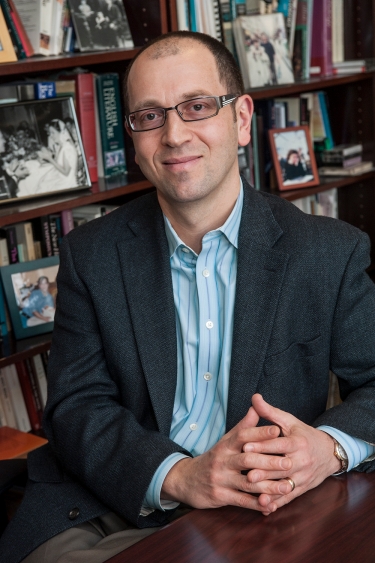
By
In his groundbreaking new book, I SAW IT: Ilya Selvinsky and the Legacy of Bearing Witness to the Shoah, Professor of Russian, English, and Jewish Studies Maxim D. Shrayer is the first to explore how Jewish-Russian poets became the earliest literary witnesses to the Holocaust (Shoah).
Shrayer brings a new and illuminating perspective to Holocaust studies and Soviet historical studies, and highlights a critical, but previously unexamined, dimension of the world’s awareness of the Shoah. I SAW IT “closes gaps in the history of Soviet Russian literature and in the history of the literature of the Holocaust,” according to Leona Toker of the Hebrew University of Jerusalem.
I SAW IT introduces the work of Ilya Selvinsky (1899-1968), the first Jewish-Russian poet to depict the Holocaust in the occupied Soviet territories. Selvinsky spoke of the Shoah and of Jewish losses in the Soviet press as early as January-February 1942, long before the subject entered the North American cultural mainstream.
“Selvinsky and other Jewish-Russian authors viewed the war and their calling not only in Russian and Soviet terms, but also in Jewish ones,” Shrayer explained. “By bearing witness to the immediate aftermath of the murder of Jews by Nazis and their accomplices in the occupied Soviet territories, Selvinsky simultaneously committed acts of civic courage and Jewish zealotry. His contribution to Shoah literature is all the more significant because he managed to keep his poems in print during the most destructive years for Soviet Jewish culture.”
While serving as a military journalist in January 1942, Selvinsky witnessed the immediate aftermath of the massacre of thousands of Jews outside the Crimean city of Kerch. He then composed and published poems about it.
Shrayer reconstructs the details of the Nazi atrocities witnessed by Selvinsky, and shows that in 1943, as Stalin’s regime increasingly refused to report the annihilation of Jews in the occupied territories, Selvinsky paid a high price for his writings and actions.
“It fell to Jewish-Russian poets to tell the Soviet people and the world that the Nazi atrocities, which the Soviet government tended to present as aimed at ‘peaceful civilians,’ were systematic acts of genocide carried out with the purpose of a total annihilation of the Jews,” said Shrayer, who co-founded BC’s Jewish Studies Program at BC in 2005, introduced courses on Jewish literature and culture in the BC curriculum, and works closely with other colleagues on aspects of Jewish-Christian dialogue.
Titled after one of Selvinsky’s poems, I SAW IT features more than 60 rare photographs and illustrations and includes Shrayer’s translations of the poet’s principal Shoah poems.
A prolific, acclaimed and award-winning scholar, author and translator, Shrayer considers I SAW IT to be the most important book of his career.
“This book is about the memory of the Shoah and about the poets’ mission as witnesses and memory-keepers. I don’t believe I could ever write another book as steeped in the history of the most devastating crisis of humanity,” he said. “Researching and writing this book pushed its author to live the Shoah by reconstructing both the suffering of the victims and the wrath and trepidation of the earliest witnesses. I wanted to understand what Selvinsky experienced as he stood, in January 1942, over an anti-tank ditch filled to the brim with thousands of bodies of massacred Jews.
“This book,” he added, “is dedicated to the memory of my paternal grandfather Pyotr (Peysach) Shrayer, who volunteered in 1941 and finished the war as a 34-year-old lieutenant-commander at Königsberg, fighting against Nazism.”
Shrayer’s book is based on years of both archival and field research—including in the former Soviet Union at the sites of mass executions of Jews in 1941-1942—and on previously unknown historical evidence.
Part of the research was made possible by a Boston College Research Incentive Grant, which Shrayer gratefully acknowledges. The completion of his project was supported by a 2012 John Simon Guggenheim Memorial Foundation award. Guggenheim Fellowships recognize advanced professionals in all fields who exhibit unusually distinguished achievement and exceptional promise for future accomplishments.
Shrayer’s book has already garnered attention and praise from the world’s leading Holocaust researchers in the US, Europe and Israel.
According to Timothy Snyder of Yale University, author of Bloodlands, “This beautifully close reading of a major Soviet poet restores for us an important vision of the Holocaust.”
“This is the remarkable story, never before told, of the Jewish-Russian poet Ilya Selvinsky, who despite all odds first taught his fellow Jews and Russians how to mourn their incalculable losses,” commented David G. Roskies of the Jewish Theological Seminary.
“A sophisticated literary analysis of Ilya Selvinsky’s texts, Maxim D. Shrayer’s book demonstrates a deep knowledge of the history of the Holocaust in the USSR,” said Ilya Altman of the Russian State University for the Humanities and the Russian Holocaust Center. “It is the first study of poet’s career in the context of Shoah memorization. Shrayer’s book must be published in Russian translation.”



